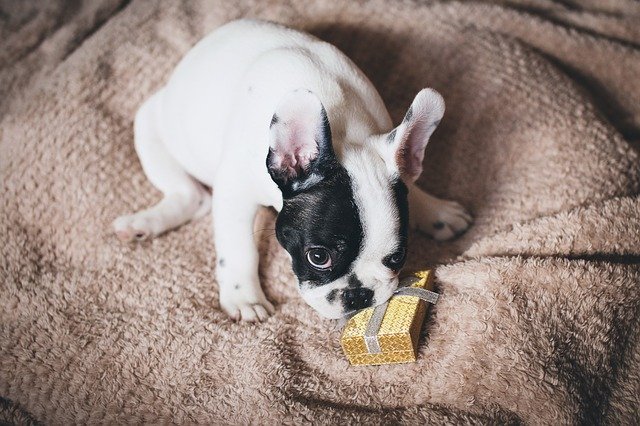
How to Keep Your Pets Safe Through the Holidays
Holiday presents for dogs and cats
Dogs: For heavy chewers, look for durable, rubber toys. Kong has a great line of chewies designed to let you stuff snacks or peanut butter into them—awesome for keeping bored dogs busy through the cold months! Avoid hard bones. If you can’t indent your thumb nail in to it, something is hard enough to potentially break teeth). Squeaky toys are great for some dogs, but make sure they don’t ingest the squeaker or fuzz. For treats, avoid pet jerkies (even those made in the US): The FDA has linked many brands with kidney failure. If your pet is battling the bulge, aim for smaller low-calorie snacks.
Cats: Even indoor cats can get extra bored during the winter, when there’s less activity going on outside the window. Spice up their lives with things to chase: Feathers on a stick, balls with a bell, and mouse toys. And, everything is better when catnip is involved. If your cat has been extra good, consider buying it a new cat tree to scratch and climb. Cats love to view their world from a high vantage point, so be sure to place their tree in a central location in your home to encourage them to use it.
Pet-safe decorations
Christmas trees can be exciting new additions for cats and dogs alike. For one, they will both want to drink water from the base. For this reason, avoid using fertilizer in the water, which could cause gastrointestinal issues.
Cats might also want to climb the tree, so make sure it is well secured, or else it could fall over. Be careful what kind of decorations you use. Curious cats love to chew on shiny tinsel, which can cause gastrointestinal obstructions. A happy dog’s tail can easily knock lower ornaments off the tree and cats love to play with ornaments. Be sure to use ornaments that are not breakable on those lower branches, and tightly secure anything made of glass or ceramic higher up. Be careful of candles, wires, and batteries. Wires and batteries can be tempting for our pets to chew on and can cause significant burns or electric shock.
As for other decorations, be aware that many types of holiday plants are poisonous to pets. Mistletoe, Holly, and Poinsettia plants can cause GI toxicity and irritation in cats and dogs. Many varieties of lilies can cause kidney failure in cats, so be sure to avoid them and opt for artificial plants.
Safe holiday eating for pets
Keep your sweets away from the animals. Everyone knows chocolate is toxic for dogs. Other toxins aren’t so easy to identify. For instance, the artificial sweetener called xylitol (found in many sugar-free candies, plus some peanut butters) can cause seizures, liver failure, and even death in dogs. Put plates of cookies high enough where dogs can’t reach. If you stuff your stockings with candy, secure them high enough so Rover can’t tug them down. Keep the lid tight on garbage cans. Even dogs and cats that do not normally “table surf” may be tempted to amid the sugary holiday cheer.
You should also be wary about feeding your pet any savory holiday leftovers. Even though animals evolved to eat meat, the high fat, super-seasoned foods human eat—especially during the holidays—can make pets very sick. Bones or other scraps can give cats and dogs pancreatitis or diarrhea. Other foods to avoid include onions, garlic, and grapes/raisins. It’s best to play it safe and save the leftovers for humans.
Four-legged holiday mingling
Finally, be aware that pets are very sensitive to changes in the social fabric of their household. Parties can send your cat or dog into a panic attack. Overnight guests could upset their sense of home. A stressed pet is more likely to bite or try to escape, so it is much better to avoid this situation in the first place. This doesn’t mean you need to cancel all your parties, just plan it so your pet doesn’t freak out. Set aside a quiet place for your animal to retreat. If your pet is easily overwhelmed or not used to kids, they would be less stressed in a separate room away from the chaos of the crowd.
Also, make sure overnight guests keep all their medications out of reach so that pets cannot get into something that could be potentially toxic.
Spotsylvania Animal Hospital provides medical and surgical care for every stage of your pet's life including preventive wellness care exams and vaccines, spays/neuters, and a variety of specialized care for your dog or cat. Learn more about us!

